Uncategorized
Bitcoin gains traction in West Africa with educational drive
As anti-French sentiment rides high in West Africa, Bitique opens its doors, the “Bitcoin Mastermind” conference beckons and more nodes come online…

As anti-French sentiment rides high in West Africa, Bitique opens its doors, the “Bitcoin Mastermind” conference beckons and more nodes come online to verify the Bitcoin blockchain.
Bitcoin (BTC) adoption in West Africa is dominated by Nigeria, the crypto powerhouse and the region’s economic engine. But against a backdrop of anti-French sentiment, Bitcoin educational efforts are also bubbling away in French-speaking West Africa.
Senegal recently opened its first physical Bitcoin exchange and education center called Bitique, and the country of 17 million people will host another Bitcoin Forum in the capital, Dakar, in December, where pseudonymous local Bitcoin advocate, known as Nourou, runs an independent Bitcoin node beamed from space.
In Benin, a country of 13 million people to the west of Nigeria, the Bitcoin-only Bitcoin Mastermind conference takes place next month. The first of its kind in the country, Bitcoin Mastermind unites Bitcoin entrepreneurs and crypto enthusiasts from homegrown groups and businesses such as Izichange, GoesPay and Flash, and it offers locals a space to learn about Bitcoin.
Cointelegraph spoke with Nourou, the founder of Dakar Bitcoin Days and Bitcoin Senegal, and Loïc Kassamoto, the founder of Bitcoin Mastermind, to better understand the Bitcoin and West African crypto evolution — or revolution.
A rising tide lifts all boats
Countries in French-speaking West Africa are subjected to the West African CFA franc currency, described by the Economist as a “colonial hangover.” The Senegalese are vocal in their criticism of the currency, with some Bitcoin advocates, such as local crypto enthusiast and entrepreneur Mama Bitcoin, explaining that it’s pretty normal to complain about the currency — an implicit criticism of post-colonial French policy in the region.
Anti-French sentiment has historically existed in the region but has recently manifested in public demonstrations. Neighboring Mali recently dropped French as the nation’s official language — a law in place since the country won its independence in 1960.
In Niger, to the east of Mali and north of Nigeria, a recent military coup represented a significant setback for French President Emmanuel Macron and France’s military strategy in the region. Well-known French newspaper Le Monde commented that the coup was a “new heavy blow” for France’s military strategy in Niger’s Sahel region.
A groundswell of alternative currency initiatives is occurring across French-speaking West Africa. Growing numbers of Senegalese are turning to Bitcoin as a savings tool and a means of exchange, while in Benin, Bitcoin Mastermind’s Kassamoto told Cointelegraph the number of Beninois turning to Bitcoin is also on the up.
Magazine: Bitcoin in Senegal: Why is this African country using BTC?
In the West, much financial discussion and education tends to take place online. However, the emphasis in West African countries is on physical meetups and real-life interaction. During the COVID-19 pandemic, Nourou said that discussions about Bitcoin and money were transferred and confined to online platforms such as ClubHouse and X (formerly Twitter), but more and more physical spaces have opened up post-pandemic.

Indeed, as Kassamoto explains, one of the keys to unlocking deeper levels of financial education and demonstrating how West Africans could use a decentralized currency such as Bitcoin is through interactions in the real world:
“Bitcoin conferences, meetups and shops provide opportunities for education, outreach and direct interaction. Conferences and meetups bring the community together, share knowledge and exchange experiences.”
Norou opened Bitique, which is Dakar’s first physical Bitcoin store for buying and selling cryptocurrency. He explained that in addition to trading services, there will also be educational programs for people to learn about Bitcoin in person: “Training courses will be around 10,000 francs [$16] for two or even three hours of training.”
The in-person training goes hand in hand with a series of classroom sessions that Bitcoin Senegal conducts nationwide called the “Baol Digital Kids” program, which teaches kids how to use Bitcoin and the Lightning Network.
@SeckIdrissa, un membre actif de notre communauté, vient d'animer une session de sensibilisation sur la thématique Bitcoin/cryptomonnaies à de jeunes enfants, lors du "Baol Digital Kids" organisé par @xaralatech.
— ₿itcoin Sénégal (@bitcoin_sen) August 11, 2023
Une initiative à encourager et à soutenir pic.twitter.com/aX4u9kVFoz
The kids in the video who received and sent their first satoshis via the layer-2 Lightning Network can spend the money at a growing number of merchants listed on the open-source Bitcoin tool BTCmap.org. In just 18 months, Dakar has developed from one small Bitcoin office to tens of artisans, restaurants and cafés accepting the cryptocurrency.
Nourou recently received a Blockstream Satellite kit, which, once set up, will allow him to run a Bitcoin node that will be protected against network interruptions. The internet service can sometimes be patchy and unreliable in West Africa. According to Blockstream, the satellite kit ensures that any connected Bitcoin full node “will not be isolated or partitioned,” with blocks streaming continuously for the node to verify.
Across a few borders in Benin, Kassamoto, along with his peers, runs what he believes to be one of Benin’s first Bitcoin nodes.
8GB of Ram and using the Ubuntu process from Umbrel and bim we became probably one of the first to run a Bitcoin node in Benin
— Loïc Kassamoto (@Loicbtc) January 24, 2023
We'll share more experience about this soon.
He explains that Bitcoin adoption has increased, but it comes with risks due to its association with crypto:
“Bitcoin adoption in West Africa is greatly helped and hindered by cryptocurrencies.”
Kassamoto said that the money-making side of crypto attracts more and more people into the “crypto universe,” but crypto scams, loss and rug pulls taint Bitcoin’s appeal. The promise of crypto riches drawing noobies into Bitcoin is not necessarily good.
“It’s toxic for Bitcoin because these people are very quickly disappointed with their loss and associate it with Bitcoin because they haven’t even had time to understand the difference between the two,” he said.
Kassamoto said that “Bitcoin, not crypto,” is what the West African community should understand.
There are more Bitcoin meetups and, therefore, more opportunities to demonstrate what many Bitcoin exchanges and thought leaders have preached for some time: that there could be a difference between Bitcoin and the rest of the crypto market.
Related: Worldcoin cryptocurrency project suspended in Kenya
The Central African Republic, which made headlines in 2022 for adopting Bitcoin as legal tender, was elevated and then dropped by large swathes of the Bitcoin community. After adopting Bitcoin, it announced its own crypto token, Sango Coin, while the country is now experimenting with tokenizing real-world assets such as farmland.
In Ghana, to the east of Benin, another large Bitcoin and educational conference will occur this year. Strike CEO Jack Mallers and Human Rights Foundation chief strategy officer Alex Gladstein will speak as part of a Bitcoin educational drive in West Africa.
cryptocurrency bitcoin blockchain crypto btc pandemic covid-19 cryptoUncategorized
One city held a mass passport-getting event
A New Orleans congressman organized a way for people to apply for their passports en masse.

While the number of Americans who do not have a passport has dropped steadily from more than 80% in 1990 to just over 50% now, a lack of knowledge around passport requirements still keeps a significant portion of the population away from international travel.
Over the four years that passed since the start of covid-19, passport offices have also been dealing with significant backlog due to the high numbers of people who were looking to get a passport post-pandemic.
Related: Here is why it is (still) taking forever to get a passport
To deal with these concurrent issues, the U.S. State Department recently held a mass passport-getting event in the city of New Orleans. Called the "Passport Acceptance Event," the gathering was held at a local auditorium and invited residents of Louisiana’s 2nd Congressional District to complete a passport application on-site with the help of staff and government workers.
'Come apply for your passport, no appointment is required'
"Hey #LA02," Rep. Troy A. Carter Sr. (D-LA), whose office co-hosted the event alongside the city of New Orleans, wrote to his followers on Instagram (META) . "My office is providing passport services at our #PassportAcceptance event. Come apply for your passport, no appointment is required."
More Travel:
- A new travel term is taking over the internet (and reaching airlines and hotels)
- The 10 best airline stocks to buy now
- Airlines see a new kind of traveler at the front of the plane
The event was held on March 14 from 10 a.m. to 1 p.m. While it was designed for those who are already eligible for U.S. citizenship rather than as a way to help non-citizens with immigration questions, it helped those completing the application for the first time fill out forms and make sure they have the photographs and identity documents they need. The passport offices in New Orleans where one would normally have to bring already-completed forms have also been dealing with lines and would require one to book spots weeks in advance.
These are the countries with the highest-ranking passports in 2024
According to Carter Sr.'s communications team, those who submitted their passport application at the event also received expedited processing of two to three weeks (according to the State Department's website, times for regular processing are currently six to eight weeks).
While Carter Sr.'s office has not released the numbers of people who applied for a passport on March 14, photos from the event show that many took advantage of the opportunity to apply for a passport in a group setting and get expedited processing.
Every couple of months, a new ranking agency puts together a list of the most and least powerful passports in the world based on factors such as visa-free travel and opportunities for cross-border business.
In January, global citizenship and financial advisory firm Arton Capital identified United Arab Emirates as having the most powerful passport in 2024. While the United States topped the list of one such ranking in 2014, worsening relations with a number of countries as well as stricter immigration rules even as other countries have taken strides to create opportunities for investors and digital nomads caused the American passport to slip in recent years.
A UAE passport grants holders visa-free or visa-on-arrival access to 180 of the world’s 198 countries (this calculation includes disputed territories such as Kosovo and Western Sahara) while Americans currently have the same access to 151 countries.
stocks pandemic covid-19 grantsUncategorized
Fast-food chain closes restaurants after Chapter 11 bankruptcy
Several major fast-food chains recently have struggled to keep restaurants open.

Competition in the fast-food space has been brutal as operators deal with inflation, consumers who are worried about the economy and their jobs and, in recent months, the falling cost of eating at home.
Add in that many fast-food chains took on more debt during the covid pandemic and that labor costs are rising, and you have a perfect storm of problems.
It's a situation where Restaurant Brands International (QSR) has suffered as much as any company.
Related: Wendy's menu drops a fan favorite item, adds something new
Three major Burger King franchise operators filed for bankruptcy in 2023, and the chain saw hundreds of stores close. It also saw multiple Popeyes franchisees move into bankruptcy, with dozens of locations closing.
RBI also stepped in and purchased one of its key franchisees.
"Carrols is the largest Burger King franchisee in the United States today, operating 1,022 Burger King restaurants in 23 states that generated approximately $1.8 billion of system sales during the 12 months ended Sept. 30, 2023," RBI said in a news release. Carrols also owns and operates 60 Popeyes restaurants in six states."
The multichain company made the move after two of its large franchisees, Premier Kings and Meridian, saw multiple locations not purchased when they reached auction after Chapter 11 bankruptcy filings. In that case, RBI bought select locations but allowed others to close.
Image source: Chen Jianli/Xinhua via Getty
Another fast-food chain faces bankruptcy problems
Bojangles may not be as big a name as Burger King or Popeye's, but it's a popular chain with more than 800 restaurants in eight states.
"Bojangles is a Carolina-born restaurant chain specializing in craveable Southern chicken, biscuits and tea made fresh daily from real recipes, and with a friendly smile," the chain says on its website. "Founded in 1977 as a single location in Charlotte, our beloved brand continues to grow nationwide."
Like RBI, Bojangles uses a franchise model, which makes it dependent on the financial health of its operators. The company ultimately saw all its Maryland locations close due to the financial situation of one of its franchisees.
Unlike. RBI, Bojangles is not public — it was taken private by Durational Capital Management LP and Jordan Co. in 2018 — which means the company does not disclose its financial information to the public.
That makes it hard to know whether overall softness for the brand contributed to the chain seeing its five Maryland locations after a Chapter 11 bankruptcy filing.
Bojangles has a messy bankruptcy situation
Even though the locations still appear on the Bojangles website, they have been shuttered since late 2023. The locations were operated by Salim Kakakhail and Yavir Akbar Durranni. The partners operated under a variety of LLCs, including ABS Network, according to local news channel WUSA9.
The station reported that the owners face a state investigation over complaints of wage theft and fraudulent W2s. In November Durranni and ABS Network filed for bankruptcy in New Jersey, WUSA9 reported.
"Not only do former employees say these men owe them money, WUSA9 learned the former owners owe the state, too, and have over $69,000 in back property taxes."
Former employees also say that the restaurant would regularly purchase fried chicken from Popeyes and Safeway when it ran out in their stores, the station reported.
Bojangles sent the station a comment on the situation.
"The franchisee is no longer in the Bojangles system," the company said. "However, it is important to note in your coverage that franchisees are independent business owners who are licensed to operate a brand but have autonomy over many aspects of their business, including hiring employees and payroll responsibilities."
Kakakhail and Durranni did not respond to multiple requests for comment from WUSA9.
bankruptcy pandemicUncategorized
Industrial Production Increased 0.1% in February
From the Fed: Industrial Production and Capacity Utilization
Industrial production edged up 0.1 percent in February after declining 0.5 percent in January. In February, the output of manufacturing rose 0.8 percent and the index for mining climbed 2.2 p…

Industrial production edged up 0.1 percent in February after declining 0.5 percent in January. In February, the output of manufacturing rose 0.8 percent and the index for mining climbed 2.2 percent. Both gains partly reflected recoveries from weather-related declines in January. The index for utilities fell 7.5 percent in February because of warmer-than-typical temperatures. At 102.3 percent of its 2017 average, total industrial production in February was 0.2 percent below its year-earlier level. Capacity utilization for the industrial sector remained at 78.3 percent in February, a rate that is 1.3 percentage points below its long-run (1972–2023) average.Click on graph for larger image.
emphasis added
This graph shows Capacity Utilization. This series is up from the record low set in April 2020, and above the level in February 2020 (pre-pandemic).
Capacity utilization at 78.3% is 1.3% below the average from 1972 to 2022. This was below consensus expectations.
Note: y-axis doesn't start at zero to better show the change.
 The second graph shows industrial production since 1967.
The second graph shows industrial production since 1967.Industrial production increased to 102.3. This is above the pre-pandemic level.
Industrial production was above consensus expectations.
-

 Uncategorized3 weeks ago
Uncategorized3 weeks agoAll Of The Elements Are In Place For An Economic Crisis Of Staggering Proportions
-

 International1 week ago
International1 week agoEyePoint poaches medical chief from Apellis; Sandoz CFO, longtime BioNTech exec to retire
-

 Uncategorized4 weeks ago
Uncategorized4 weeks agoCalifornia Counties Could Be Forced To Pay $300 Million To Cover COVID-Era Program
-

 Uncategorized3 weeks ago
Uncategorized3 weeks agoApparel Retailer Express Moving Toward Bankruptcy
-

 Uncategorized4 weeks ago
Uncategorized4 weeks agoIndustrial Production Decreased 0.1% in January
-

 International1 week ago
International1 week agoWalmart launches clever answer to Target’s new membership program
-

 Spread & Containment3 days ago
Spread & Containment3 days agoIFM’s Hat Trick and Reflections On Option-To-Buy M&A
-

 Uncategorized4 weeks ago
Uncategorized4 weeks agoRFK Jr: The Wuhan Cover-Up & The Rise Of The Biowarfare-Industrial Complex



















